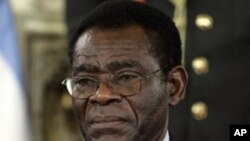Human rights activists are expressing outrage at the selection of Equatorial Guinea President Teodoro Obiang as the new rotating head of the African Union. They say the choice of a former coup leader comes at a very bad time, with two dozen African countries holding elections this year.
U.S.-based Human Rights Watch and the Senegal-based African Assembly for the Defense of Human Rights are some of the groups expressing grave concern following Mr. Obiang's selection.
Mr. Obiang has been in power in Equatorial Guinea since 1979. He won a presidential election with more than 95 percent of the vote in 2009.
Activists accuse him of rigging elections, torturing or buying off opponents, and looting some of the country's vast oil wealth for his own interests. Mr. Obiang denies the accusations, and says he is bringing prosperity and stability to his country.
His defeated opponent in the last election, Placido Mico, also condemned the African Union choice.
A Washington-based group called EG Justice says Equatorial Guinea does not follow fundamental principles outlined by the African Union, such as fostering democracy, promoting human rights and combating corruption.
Joe Kraus, the group's program and development director, was not surprised by this contradiction.
"It seems like the priorities of the African Union, they really put an emphasis on African unity, and so I think you can see in the appointment of Mr. Obiang, an element of that, where the first priority is showing respect and deference to other African leaders, and sovereignty is a primary concern. And then you have a number of principles that talk about human rights and corruption and democracy, and things like that, and it seems like those are secondary issues as far as implementation. Equatorial Guinea is by no means the only African country that has signed on to different charters of the African Union but actually has not made a lot of progress," he said.
The one-year posting gives the opportunity for an African president to speak on behalf of the continent and act as a mediator when problems arise.
One pending issue is resolving the impasse in divided Ivory Coast, where African Union officials say challenger Alassane Ouattara won elections last year, but incumbent President Laurent Gbagbo refuses to cede power.
In his acceptance speech, in Ethiopia Sunday, Mr. Obiang said the concepts of democracy, human rights and good governance should, in his words, be adapted to African culture.
The leadership post passes from one region to another every year, and 2011 was scheduled for Central Africa, which is dominated by long-time, autocratic rulers and sons of former leaders.




